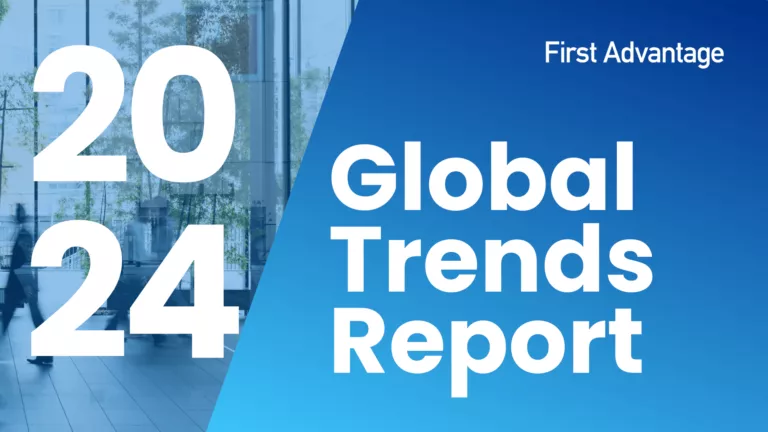Next-gen tools can help simplify this increasingly vital task, and deliver better results
Background checks can help you verify who applicants are not—meaning, they’re not a convicted criminal, not included on a terrorist watch list, not currently using illicit drugs, etc.—in addition to validating key information or credentials. After that, it’s often up to you to piece together the rest of their story through interviews and other personal interactions. But sometimes, after all that, it’s still hard to tell what an applicant is really like, or if they’ll they be a good fit.
For a bigger picture, some companies are interested in an applicant’s social media profile. Unlike a rehearsed interview where you only see and hear what applicants show you at the moment, social media offers a public platform where many people openly share the details of their lives—the good, the bad and, yes, the ugly. It can help you plug in the gaps and better understand applicants, in a way that no other screening tool can.
60 percent of companies are using social media screening, but there’s a problem
According to CareerBuilder, 60 percent of organizations are using public social media or online searching to screen job applicants in 2016. However, most of those companies do it manually, which presents issues.
First, it takes a lot of time to research an applicant online through search engines and multiple social media sites. Apart from the time spent looking through lengthy histories of past posts, it requires significant effort just to accurately confirm an identity since there’s often more than one individual with the same name.
Second, you can’t “unsee” things like a picture of a couple at their baby shower, and that can get you in trouble from an employment law perspective. The Equal Employment Opportunity Commission (EEOC) assumes that if you accessed the information, you used it in your employment decision, according to Pamela Devata, a labor and employment law attorney with Seyfarth Shaw, LLC.
Third, this process can be inconsistent. Consistency is critical with any type of background screening—particularly with social media screening. The public profiles of applicants can vary dramatically, in terms of amount and type of content. Without a standardized, automated process for accessing, viewing, evaluating, documenting and protecting social media data, organizations can quickly land in hot water. Here’s why: the same rules that apply to other forms of background checks – think: Fair Credit Reporting Act (FCRA) – , the EEOC — apply to social media screening.
Smarter, more effective social media screening is available
Don’t let the caveats scare you. Social media data can offer unique and powerful applicant insights that can help strengthen your hiring performance. However, instead of manually digging through multiple websites and pages of social media posts, consider using an automated social media search.
First Advantage recently partnered with Fama, a software company that offers social media screening to help hiring managers gather and make sense of vast unstructured public data sets. Their solution uses automation to instantly scour online and social media sources.
Fama can confidently identify the right John Smith, since they specially developed their technology to distinguish an applicant’s set of public social media profiles from other similar identities with pinpoint accuracy. Using artificial intelligence, the software can then pick up on the ‘red flags’ and ‘green flags’ within a person’s online persona. These flags allow employers to zero in on the needles in the social media haystack: red flags might include references to abusive behavior, bigotry, illegal drugs or discriminatory behavior, while the ‘green flags’ might reference a person’s passion for charity work.
You simply define the type of social media data that’s relevant to your hiring decisions, and the solution does the research for you. In addition to saving you valuable time and internal resources, Fama also protects you by only returning information deemed as relevant or important to your company. In other words, you don’t have to worry about “unseeing” images, tweets, posts or profile data that might subconsciously factor into a hiring decision that’s not compliant with employment laws. Also, there’s no scoring involved; instead, Fama returns only the data you requested to help you better understand applicants and make stronger hiring decisions. Fama is FCRA compliant and is built within the specifications of the EEOC.
The solution also resolves other potential issues associated with manual social media screening. You can confidently identify the right John Smith, since Fama specially developed its technology to distinguish a applicant’s set of public social media profiles from other similar identities with pinpoint accuracy. What’s more, the software can “learn” your content preferences, and over time will return increasingly relevant data based on what your company defines as a ‘good’ or ‘risky’ hire. Basically, the more you use it, the better it gets.
The next big thing is here—will you embrace it?
With the intensive, worldwide use of social media platforms by users of all ages, social media screening is—without a doubt—the next big thing in background screening. It helps employers augment the data gathered in a traditional background check with more personal insights about their applicants to help them better understand the person and whether they’re a good fit for the position, or the organization.
If you’re not already doing it, now is the time to get started. If you are doing it, but you’re manually screening applicants, it’s time to switch to a more efficient, effective solution that helps strengthen your hiring compliance, instead of putting it at risk. Read more about our strategic partnership with Fama by clicking here. Learn more about the Fama solution by visiting their website: http://fama.io
Finding and retaining the right people every day can be made a little easier with First Advantage. Our powerful combination of searches and services provide the insights to reduce your risk while dramatically improving the quality of your talent. For these reasons, First Advantage has become a trusted partner to over 45,000 organizations worldwide – we deliver the results you need to propel faster, more informed decisions. Learn more at https://www.fadv.com

 京公网安备 11010502052956号
京公网安备 11010502052956号

